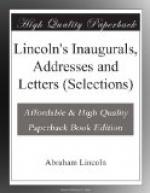THE FIRST INAUGURAL ADDRESS.
The First Inaugural was carefully written in Springfield a month before its delivery. Contrary to his usual practice in public speaking, Lincoln read from the MS. The address was enthusiastically received by an immense audience assembled front of the Capitol and the general impression produced at the North was favorable. By the Southern and the Abolition press it was severely criticised, both with regard to its form and its content.
The mystic chords of memory. This passage was suggested by Mr. Seward, to whom the address had been submitted for criticism. The customary usury of genius was paid for the verbal loan.
RESPONSE TO SERENADE.
This speech was delivered before a delegation of New Yorkers, who called at the White House on the evening of March 4. Two other similar responses have been preserved from the same day. The present address is reprinted here for the first time, from the New York Times.
LETTER TO HORACE GREELEY.
Greeley’s letter of August 19, which was headed “The Prayer of Twenty Millions,” began as follows: “I do not intrude to tell you—for you must know already—that a great proportion of those who triumphed in your election, and of all who desire the unqualified suppression of the Rebellion now desolating our country, are sorely disappointed and deeply pained by the policy you seem to be pursuing.” That Lincoln had good reason to complain of “an impatient and dictatorial tone” is sufficiently shown by the closing sentence, “I entreat you to render hearty and unequivocal obedience to the laws of the land.” The following issue of the Tribune contained a long editorial on the same subject. The influence of the Tribune in the Northern States was immense, and Lincoln realized the importance of making a clear statement of his policy to its readers.
SECOND ANNUAL MESSAGE TO CONGRESS.
After a long statement about the conditions of the finances and of the different departments, the President devoted the remainder of the space to the discussion of compensated emancipation, on which he had already made a recommendation earlier in the year in a special message to Congress. The concluding paragraph is in the elevated style of the Inaugurals.
THE EMANCIPATION PROCLAMATION.
The first draft of the Proclamation was submitted to the Cabinet in the preceding July, with the remark that he had fully determined to issue it immediately. Secretary Seward suggested that its issue be postponed until it could be given to the country supported by some military success. The President saw the force of the suggestion and waited until after the battle of Antietam. The Preliminary Proclamation was dated September 22, 1862. In a reply to a serenade two days later the President said: “I can only trust in God I have made no mistake.”




